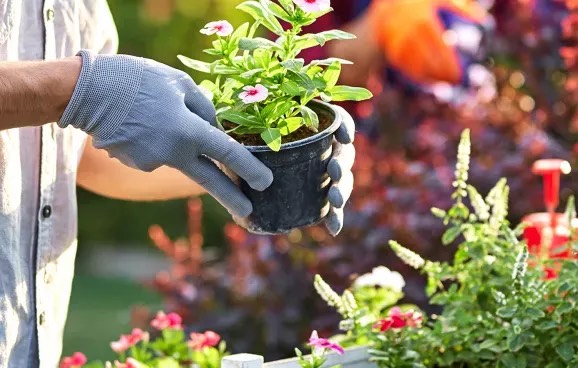
Keeping young minds active is no easy task but engaging growing bodies with hand-on activities is sure to impact them positively, both physically and mentally. When you’re gardening, you are constantly moving around and this movement raises your heart rate, giving you more oxygen. During this exercise, we also experience endorphins which release “happy hormones” — so busy kids are happy ones. If physical movement is limited, you can adapt your garden to suit your needs. To stop having to bend down, you can incorporate raised beds or go for pots on a workbench instead of heavy digging.
There’s a lot the garden can do for your mental health, too. If being stuck inside has got you down, get gardening. Studies have shown that a bacterium found in soil can boost resistance against stress, with further research showing that children exposed to this beneficial bacteria are more resilient to stress and less likely to develop mental illnesses.

A learning landscape
The garden is perfect as a classroom. From seeds to trees, bacteria to birds, there are so many lessons that the kids can learn just by stepping outside. For starters, growing plants teaches them that a massive number of creatures – including earthworms, earwigs, moles and woodlice – contribute to our garden spaces. Set your little ones on a quest to find mini-beasts and it will encourage them to discover that life is abundant in the garden and it all has a part to play in the life cycle of plant growth.
If you have a compost heap, kids can learn that soil is alive! Ask them to help out with adding kitchen waste and turning the heap. You can make a game of identifying which materials are “green” and “brown”. Older children have an opportunity to learn that green materials are high in nitrogen, while brown materials are carbon rich and that these two nutrients offer different benefits to the soil and plants. Show them how to sprinkle Levington Organic Compost Maker evenly over the mixture to speed up the composting process by stimulating bacteria growth. Together, this finished product can be added to plants and crops to help them grow.
Get hands-on
A child-friendly gardening project is just the ticket to help little ones develop gross and fine motor skills. This is important for all ages, even for adults, to maintain our ability to carry out the movements that we rely on every day. Fine motor skills involve precise and intricate movements, like sowing small seeds, while gross motor skills include large movements when using a trowel, lifting pots, or digging holes.
The many hands-on tasks associated with gardening will help children to train their hand-eye coordination whilst using a wide variety of muscle groups, so it’s really beneficial. If you’re lacking in garden space, don’t worry, you can bring the joys of the outside in. Any plant positioned on a windowsill, balcony, or patio, can bring these benefits to your doorstep. I have even planted up an old pair of Wellington boots with my kids before and they loved it.

Engage imaginations
Small pots and containers give kids a manageable space to grow in and be responsible for. Use Miracle-Gro Performance Organics All Purpose Liquid Concentrate Food on the plants growing in the containers and it will result in glorious plants within one week. The feed helps plants to grow twice as big whilst being kind to nature. The added benefit is that it’s child, bee and pet-friendly. So, you can fill up the container and leave them to plant or play.
Just a bare plot of land is all your kids need to engage in imaginative play. The garden is a treasure trove of possibility to stimulate their creativity. While the weather is fair, rejuvenate your shed into a craft space or workshop and it will provide an area for creativity even when it’s overcast. Ask the kids to help decorate by making some leaf rubbings using foliage from the garden and crayons. These can be pinned to the wall to create a nature-inspired garden den. Here, they can store their own tools, press wildflowers, sow seeds, or paint pictures of plants. You’ll be surprised how much of a crossover there is between garden play and learning when you give them a space to make it their own.
Whatever your setup, there’s an opportunity to get outside and enjoy garden plants with the family, showing them how alive our gardens truly are.

